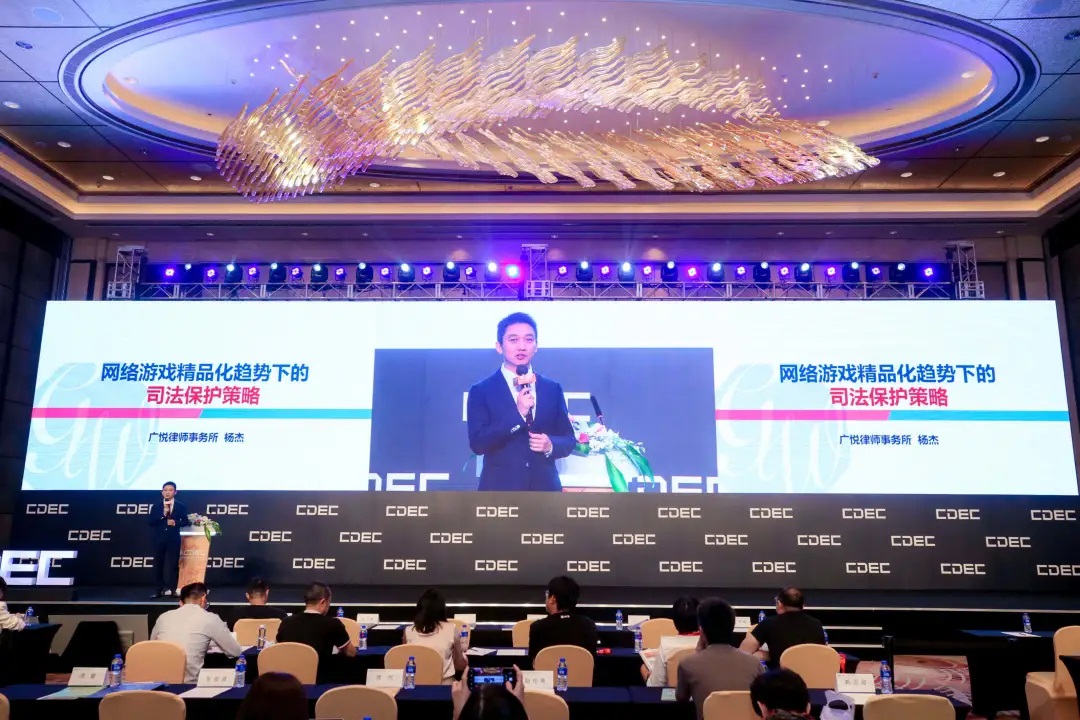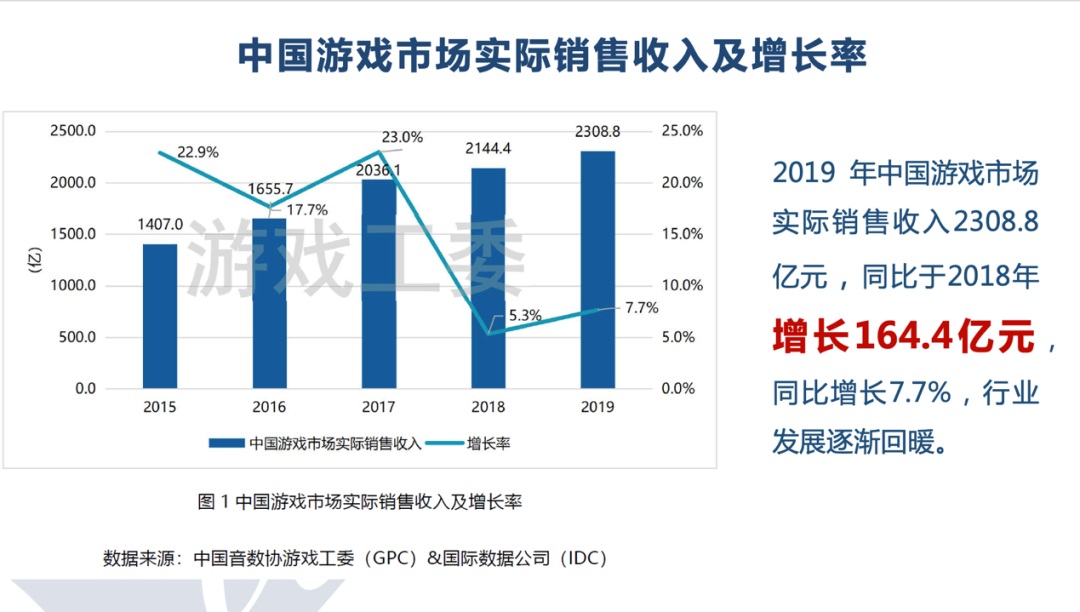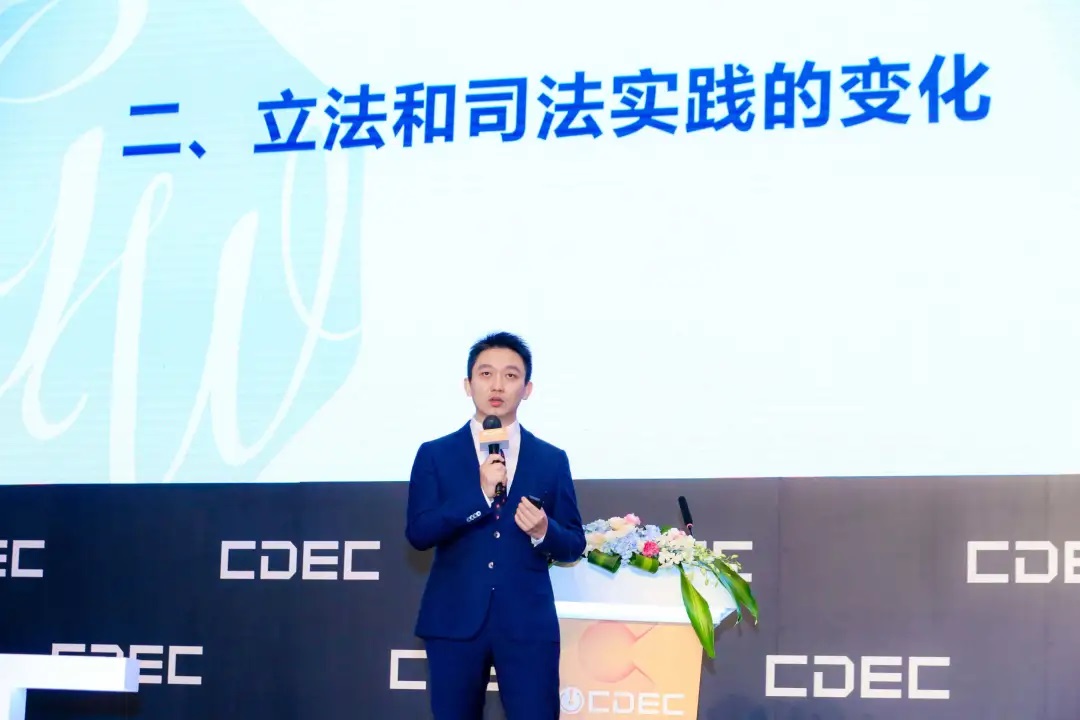The 18th China Digital Entertainment Expo and Conference (China Joy) was held in Shanghai from July 31st to August 3rd, 2020. As in previous editions, CJ held a number of themed conferences.
On the afternoon of July 30th, Mr. Jeff Yang, senior partner of Wang Jing & GH Law Firm and head of the Internet and High-Tech Department, was invited to attend the opening ceremony of the China International Digital Entertainment Industry Conference (CDEC) and delivered a speech entitled "Judicial Protection Strategy under the Trend of Online Game Quality Improvement".

The following is the full text of the speech.
Mr. Jeff Yang:
Good afternoon, everyone!
It is a great honor to be invited by the Organizing Committee to come to the stage of China Joy again and talk with you guys. I found that the guests of China Joy were excellent, and they all shared a lot of interesting insights on various topics in terms of product content and product originality. Next, I will take you guys to observe the booming online game industry from another perspective.
Let me introduce myself. My name is Jeff Yang, and I have been engaged in legal work in the online game industry for 15 years. I have witnessed the extraordinary growth of the online game industry from the very beginning, with client games, web games, H5, etc., and also witnessed the national process of gradual judicial standardization of the industry, carried out by Chinese judicial authorities. At present, our legal team mainly serves major game companies, and the Internet industry in general. As we received the invitation, we started to think about what we should share with everyone. When we consider what new dynamics the online game industry has witnessed in terms of law and regulations over the past year, the first thing to think about is what the current trend of the online game industry is. When we saw the theme of the conference, we thought that the trend of the online game industry should be -------- Quality Improvement.

Take a look at the market’s calls for high-quality products and the constant consideration given to precision and accuracy in games: the future trend of the game industry is indeed high-quality, and long-term operations of high-quality products have become the driving force of the Chinese game market.
According to the actual sales revenue and growth rate of the Chinese game market, the Chinese game market in 2019 increased by 16.44 billion yuan compared with 2018, while the number of people working in the industry only increased by 10 million.
This shows that the network game industry has entered a period of stable market development. In this period of steady development, the market has put forward higher requirements for the content and quality of the games. But I know that many of you here are industry insiders, and I am just displaying information that you already know for sure.
Under the trend of high-quality in the online game industry, what changes have taken place at the legislative and judicial level in the process of practice?

The biggest change is that the amount of compensation for online game infringement is increasing year by year. From August 30th, 2016 to 2019, the amount of compensation has increased year by year, especially in 2019, when it reached 50 million yuan for the first time.
Let me share with you guys the precedent amounts of compensation in judicial practice in the online game industry in recent years. In a copyright infringement case of the Beijing High Court, the amount of prosecution was 100 million yuan, and the amount of compensation was more than 16.3 million yuan. The Guangdong High Court sued 100 million yuan in copyright infringement and unfair disputes and awarded 20 million yuan in damages. The Jiangsu High Court sued 30 million yuan and awarded damages of 30 million yuan. The Hunan Middle Court filed a copyright unfair competition lawsuit of 50 million and sentenced 50 million. In the latter two cases, the court's judgment prescribed the maximum penalty.
(1) Punitive damages
As everyone in the online game industry knows, carrying out judicial protection in this type of industry was a big problem just a decade ago. It was difficult for the Court to understand the characteristics of the online game industry, and the criteria adopted by the Court for infringements in the industry might be the same of ordinary art standards. For example, for an infringing picture, they refer to the infringing picture of the photographic work to make a judgment. At that time, some companies often joked about this matter. In fact, the cost of infringement was not high, and the early infringement penalty amount was only tens of thousands of yuan. That is nothing for a popular game. An infringement penalty of tens of thousands of yuan is not enough to punish a game that has made tens of millions of yuan.
But in the past one or two years, more and more courts have begun to apply punitive damages. The Supreme People's Court solicited opinions on the “Opinions on Strengthening the Sanctions for Intellectual Property Infringement”. For example, the upcoming Civil Code also opens a new era of key protection of punitive damages for intellectual property rights.
Is this a good thing for the gaming industry?
Of course, there are many excellent enterprises in the online game industry that attach great importance to originality. The time cost, energy cost and money cost of originality need to be well protected by China's judicial environment.
(2) Expansion of the scope of protection
A few years ago, it was discovered that a large number of online game infringement protections was focused on the main character image infringement, as well as the scene map and other relatively clear traditional parts that could be identified as protection of works of art. In the past two years, more and more courts have begun to break through the traditional concept of IP protection in the online game industry, and have begun to pay attention to other things such as game play, UI interface and game live screen. There was a time in the game industry when there was a saying circulating around, “just copy the gameplay", because the gameplay was not protected. But now, the courts will protect more and more elements of the game industry.
(3) The court has a deeper understanding of the game
The judges have gained a deeper understanding of the online gaming industry.
For example, a case that has had a huge impact on the gaming industry over the past year was the court's first explicit interpretation of online game cloning.
The court divided the research and development of online games into five levels: The first level is positioning the type of game in the project stage; The second level is designed around the rules of the type of game; The third level is the production of the core part of the game resources, which can be divided into the route design of the map matching the battle targets, the initial numerical planning of the game characters, the assignment of parameter values and skills for each character, and the overall layout of the user interface; The fourth level is resource connection and function debugging to polish the correspondence between game rules and game resources; The fifth level is further refinement of the game resources production.
The court held that the essence of game cloning is to completely change all the art styles of the fifth layer of the game, and retain the plagiarism of the third and fourth layers, thereby simplifying the production of core game resources, which require the highest economic and time costs. After the judgment came out, I consulted a lot of senior game planners, and everyone thought that the court's conclusion was very accurate. At the same time, once the five levels of standards are divided, the definition of the so-called "game cloning" also becomes very clear, so the judge's understanding of the game is getting deeper and deeper.
In the past year, there has been another incident in the justice system that has had significant implications for the gaming industry. On April 13th, 2020, the Guangdong Higher People's Court issued trial guidelines specifically for online game industry, called “Guidelines for Online Game Intellectual Property Civil Disputes (for Trial implementation)”. It is the first normative document in China specifically for the trial of online game dispute cases. Article 40 of the Guidelines also clarifies the punitive nature, the amount of compensation according to the actual loss or according to a reasonable multiple of the share of infringement profits.
Let us consider how to conduct protection strategies under the general trend of "high-quality" games. At the trademark level, many companies will just protect the name of the game. When you apply a “high-quality” game strategy, you need to consider more aspects, such as the name of the enterprise, the names of important game characters and names of iconic scenes, as well as the coverage of peripherals, film and television categories. Of course, it is also very important for many game companies to file for trademark infringement before applying for the version number.
The protection of the game content shall be based on the original level of application for software copyright. Under the strategy of refinement, the game company shall consider copyright registration protection for art works, planning documents, music, videos, etc. There is also the core asset code of a game company. In the past, we were often familiar with the code of the first set of game software. However, the game goes through a process of frequent updates, and the code may have undergone significant changes within five months of operation. Many companies do not update the continuous versions of code V1.0, 2.0, 3.0 and 4.0, and will encounter many difficulties and obstacles in the protection of rights in the future. Therefore, it is necessary to define in advance the copyright protection of major updated versions and even the trade secret protection rules.
As the rights holders’ awareness of rights protection has been greatly enhanced, many rights holders protect their rights also overseas against infringing acts such as the promotion of materials and IP infringement. Overseas is no longer an extra-legal place for infringement and illegal hot spots.
In summary, all prevention costs will always be far lower than accident costs. As online games are becoming “refined” products, we hope that everyone can pay attention to prevention costs, and let prevention play a major role in the business process.

In the past two years, our team has done two things: last year, China Joy launched our “Online Game Company Compliance Guide”. It is the first book in the online game industry from the perspective of our company. After the launch, we got a lot of recognition, because the book contains a lot of practical suggestions. In the past year, we did another thing. We collected 100 cases selected from the online game industry from the beginning to the present, and summarized some key problems encountered in the operation of online game companies from the perspective of big data. The answer to these key questions is not the lawyer's answer, but the case's answer, and a lot of cases will tell you what to do and what not to do.
If you guys are interested in these two books you can follow our WeChat, and the top 30 WeChat followers will receive these two books away for free.
That's the end of my speech today. Thank you everyone!



